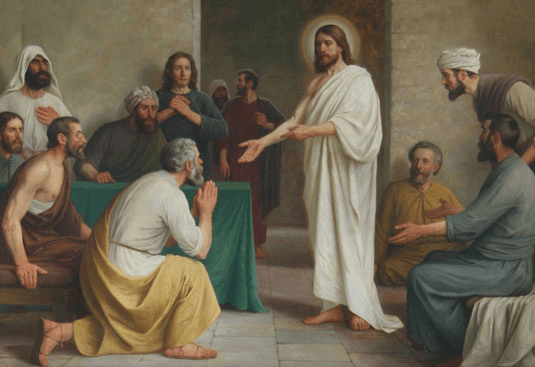

I am a devoted grandfather. The gift of grandchildren is a constant source of renewal. Even more so, I returned to New Zealand for Easter to gather with my remaining seven siblings, their children, grandchildren and great-grandchildren. It was a marvellous and delightful weekend, full of stories, song, dance, games, laughter and sadness.
There are transformative events in our lives – moments that are celebratory and those that involve grief and pain. They are transformative because the change is permanent, it challenges us to the core, we cannot return to the state we were in before that moment: the loss of a loved one, falling in love, marriage, the birth of a child, separation and divorce, abuse, children (finally) leaving home. The negative events can and do leave us reeling – it can be incomprehensible, unfathomable and perhaps unacceptable. The positive ones can bring great joy, re-start an old and worn-out heart and enliven relationships.
After the story of the road to Emmaus, Luke (24:35 – 48) recounts Jesus’ appearance to the disciples in Jerusalem. The disciples have been through a series of utterly traumatic events, Jesus’ arrest, trial, torture and crucifixion, and to totally confound them, his resurrection. His disciples are confused and anxious – having had to deal with the distress of his loss, then his missing from the tomb, and then the strange story of the travellers to Emmaus. And as if to affirm the message of those travellers, Jesus becomes present to them in flesh and blood: Writes Luke:
… they were startled and terrified and thought that they were seeing a ghost. Then he said to them, “Why are you troubled? And why do questions arise in your hearts? Look at my hands and my feet, that it is I myself. Touch me and see, because a ghost does not have flesh and bones as you can see I have.”
Then following the pattern of the Emmaus story, Jesus breaks open the Word of God and he sends the disciples out to preach the Good News (echoing the liturgy we celebrate each Sunday).
What then enables those disciples to move from their insecure fear to being confident, faith-filled proclaimers of God’s love? What is it within us that carries us from one place to another, from doubt to faith, from pain to joy, from loathing to love? What is the agent that causes or creates this transformation? Perhaps at the centre of positive experiences is happiness. Martin Seligman suggests that we are most happy when we experience pleasure, engagement, relationship, meaning and accomplishment. For Maslow, our peak experiences occur through self-actualisation. The Christian view is that these profound moments are windows into the Divine, into the life to come, into the Kingdom of Heaven – a taste of what is to come. They are beatitudes.
Pain and sadness, on the other hand, can create a sense of disadvantage, loss, helplessness, and sorrow, and if unchecked can lead to depression. And yet we are aware that from the depths of despair there arises a tiny sense of hope, a leaven that will ignite and transform our sorrow, into acknowledgement, tolerance, willingness and then acceptance. It is from here that the disciples move, and the leaven that breaks open their hearts is nothing less than the person of Jesus of himself. This same Jesus is still there and still present, waiting for an invitation from you to break open your heart and transform your life.
Enjoy your time with your family these school holidays.
Mr Peter Douglas
Director of Faith and Mission


